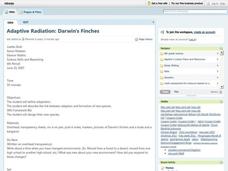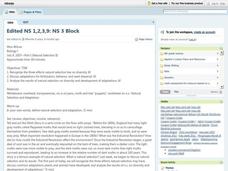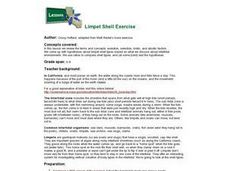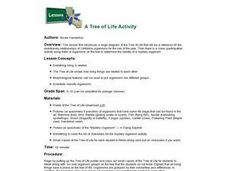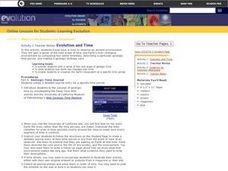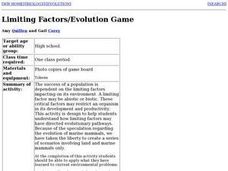Curated OER
Darwin's Finches
Seventh graders engage in a study of the Theory Of Evolution with the use of Darwin's finches as examples while making a connection to adaptive radiation. They use class discussion in order to further the lesson plan and focus upon...
Curated OER
Natural Selection And Evolution
Students investigate the concept of evolution and how natural selection is used as an indicator that evolution has happened. They recognize the three effects it has on diversity and how adaptations can develop. Diversity is explained as...
Curated OER
Natural Selection And Evolution
Seventh graders investigate the concept of natural selection and its relationship to the theory of evolution. They conduct research using a variety of resources and use the information to create a class presentation and open up the...
Curated OER
Introduction To Natural Selection
Seventh graders investigate the concept of natural selection and it relation to the theory of evolution. They create a definition for classification based upon looking at other subjects that are similar. The variation of species is...
Curated OER
Why Is Evolution Controversial?
Students explore why evolution has always been a controversial topic. They use scientific process to determine patterns and to critically analyze alternative explanations for natural phenomena.
Curated OER
Anthropology and Sociology
Learners examine the combined subjects of anthropology and sociology and explain how the disciplines would study the same issue. On poster board, they locate or draw pictures related to the two subjects. Once this is completed, students...
Curated OER
What about Continental Drift?
Fifth graders research the Continental Drift by researching for evidence of continental movement. The teaching explains the theory of plate tectonics and the Earth's magnetic field. They conclude the lesson by watching the video of "In...
Curated OER
Evolution of Life
Students explore the evolution of life. They read sections of their text and make a foldable of the key vocabulary terms. They identify two types of butterflies and represent their similarities and differences on a Venn diagram. They...
Curated OER
Darwin, Politics, and Religion
High schoolers gain an understanding of the Darwinian theory of evolution, examine how Darwin's theory has been adopted by ruling elites in order to justify their position in power, compare religious and historical responses to Darwin's...
Curated OER
Time and Earth History Socratic Questions
Students develop a sense of geologic ("deep") time and the ways in which Earth scientists construct the geologic time scale. They study he major events that shaped Earth, including the origin and evolution of its lithosphere, atmosphere,...
Curated OER
Biosphere Socratic Questions
Students examine the origin of life on Earth and its evolution through geologic time by participating in a whole class discussion. They respond to prompts that lead them to conclusions about the interactions among the biosphere and the...
Curated OER
Limpet Shell Exercise
Learners review the terms and concepts: evolution, selection, biotic, and abiotic factors. They come up with hypotheses about limpet shell types based on what we discuss about intertidal environments. Students use ratios to compare...
Curated OER
A Tree of Life Activity
High schoolers solve a mystery of the identification of a unknown organism by comparing its morphological characteristics to those in a tree of life classification poster. They compare the observable characteristics of the specimen and...
Curated OER
Wait, They Can do it by Themselves?
Students recognize the concepts of evolution and natural selection as well as cladistics and phylogenetics. They observe the process of regeneration in a sea anemone to simulate asexual reproduction.
Curated OER
Happy Birthday, Earth!
Students visualize the Earth's ecosystem at a specific time period and how Earth has changed over time. They create a detailed journal entry for a specific time period and create a birthday card to Earth.
Curated OER
How Does Evolution Work?
Students pretend they are a scientist like John Endler in this Web activity. They visit his pools, from hypotheses, and test them out. In the process, the explore about natural selection and sexual selection. They are able to explain the...
Curated OER
Why Is Evolution Controversial?
Students examine the legal side of the teaching of evolution. They study the Scopes Trial and reflect on what it means for a teacher to be denied the right to teach a key scientific concept. In addition, they design their own editorial...
Curated OER
Fossils And Migration Patterns in Early Hominids
Students plot the general distribution of major fossil hominid taxa on a small black and white world map using data provided. They infer a continent of origin and likely path of migration using a worksheet guide and small group discussion.
Curated OER
Studying Species By Examining the Evolution of the Canidae Family
Pupils read an article on the characteristics of wolves and dogs then complete a phylogenetic tree of the canid family. They then write an essay justifying why or why not wolves and dogs should be classified as different species.
Curated OER
The Ultimate Predator
Students already know that the most effective predator on earth today. They pay close attention, because after the teacher have finished lecturing, their assignment is to design a new "Ultimate Predator." Students present their...
Curated OER
Limiting Factors/Evolution Game
High schoolers play a board game with provided cards which help them realize that limiting factors may restrict an organism in its development and productivity and direct evolutionary pathways.
Curated OER
Comparative Embryology
Students compare and contrast the embryonic development of human, chicken and fish embryos. They create a detailed outline of similarities and differences among the three embryos at various stages of development.
Curated OER
Using A Winogradsky Column to Analyze Microbial Communities
Students use easily obtained materials to study ecological succession in a microbiological community. This investigation is appropriate for a variety of age groups. Elementary Students be fascinated by the changes occurring over time...
Curated OER
Time Conceptualization
Students relate the number and length of generations in their living family members to the number of generations that have passed since specific events in recorded history. They then apply this time conceptualization to the number of...


